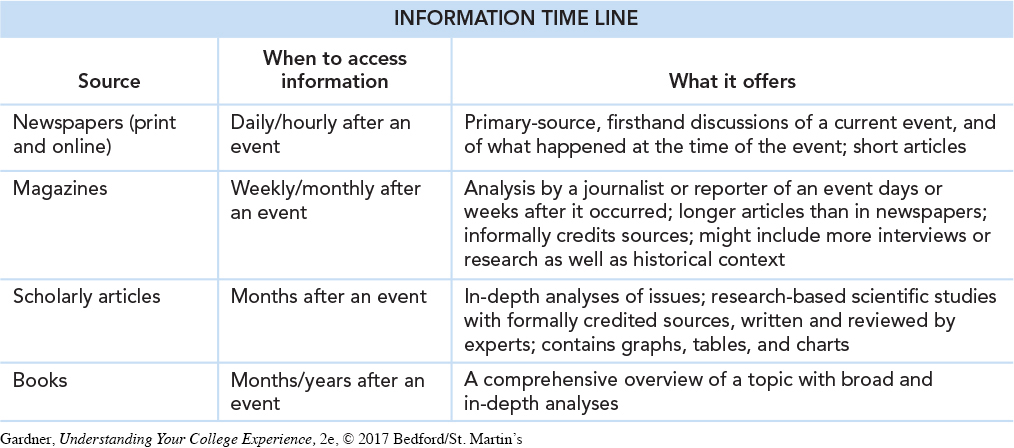9.2 CHOOSING, NARROWING, AND RESEARCHING A TOPIC
Assignments that require the use of library materials can take many forms and will be a part of most of your classes. You’ll learn several ways to search for information later in the chapter. Before you start searching, however, you need to have an idea of exactly what you’re looking for.
Choosing a topic is often the hardest part of a research project. Your instructor may assign a general topic, but to get motivated to begin your research, you’ll need to narrow it down to a particular area that interests you enough to research it. Imagine, for example, that you have been assigned to write a research paper on the topic of climate change. What steps should you take? Your first job is to get an overview of your topic. You can begin by conducting a Google search. Once you’ve found some basic information to understand your topic, you have a decision to make: What aspects of the subject will you research? Soon after you start researching your topic, you may realize that it is really large (for example, simply typing “climate change” into Google will return millions of hits) and that it includes many related subtopics. You can use this new information to create keywords. A keyword is a word or phrase that tells an online search tool what you’re looking for. You can create a list of keywords; brainstorming different terms and subtopics within your general topic will help you find resources for your topic. For example, for the topic “climate change,” keywords may include “ocean level rise,” “greenhouse effect,” “ozone layer,” “glacier recession,” or “carbon emissions.” Even those terms will generate a large number of hits, so you will probably need to narrow your search topic several times.
What you want are twelve or so focused and highly relevant hits on an aspect of the topic that you can use to write a well-organized essay. Begin by figuring out what you already know and what you would like to learn more about. Perhaps you know a little about climate change causes and effects and you’re curious about its impacts on animals and plants; in that case you might decide on a two-part topic: impacts on animals and impacts on plants. By consulting a few general sources, you’ll find that you can narrow a broad topic to something that motivates you to learn more and is a manageable size. And when you feel motivated to learn more, you are more likely to earn a better grade. You may end up focusing on the impact of climate change on one particular animal or plant in one specific geographic area.
If you are having trouble coming up with keywords, one place to begin your research is an encyclopedia, a book or an electronic database with general knowledge on a range of topics. You have probably used an encyclopedia recently—you may use one all the time without thinking about it: Wikipedia. A wiki is a type of website that allows many different people to edit its content. This means that information on wikis can be constantly changing. Many instructors feel that the information on Wikipedia cannot be guaranteed to be reliable because anyone can change it; they instead want students to use sources that have gone through a formal editing and reviewing process. Your instructors might even forbid Wikipedia; if so, avoid it altogether. Even if an instructor permits the use of Wikipedia, it’s best to use it only as a starting point for your research. Do not plan on citing Wikipedia in your final paper. Rather, check the references at the bottom of Wikipedia pages, or otherwise verify claims made at Wikipedia on another more trustworthy site.
Even with an understanding of various types of sources, it can be difficult to determine what exactly you need for your assignment. Figure 9.1 provides an overview of when to use different common research sources and gives examples of what you’ll find in each source.

YOUR TURN > WORK TOGETHER

With a classmate decide where you would go to find information about an environmental issue affecting your neighborhood. Use the chart in Figure 9.1 to determine what kind of information each source provides.